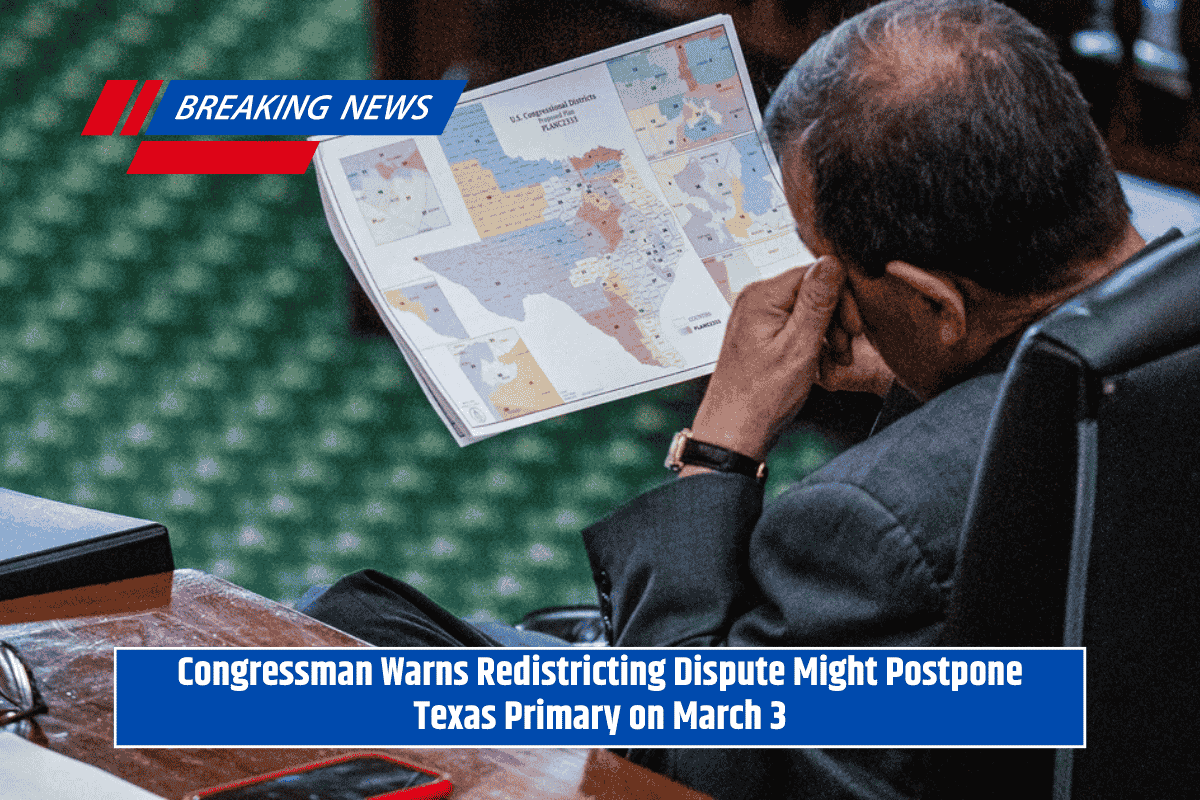U.S. Representative Marc Veasey, a Democrat from Fort Worth, has raised concerns that the upcoming Texas primary, set for March 3, could be postponed due to ongoing legal challenges against the state’s newly approved congressional maps.
Veasey, speaking in an interview with Eye on Politics, stated that while a delay is not guaranteed, it wouldn’t be surprising given the history of redistricting disputes.
“If we move forward with these maps, it wouldn’t surprise me,” he said, adding, “But it also would not shock me one bit at all based on my previous experience if we saw delayed primaries and instead of a March primary, we end up seeing a May primary.”
When asked about the likelihood of a delay, Veasey noted, “I think it’s 50-50.”
Governor Abbott’s Approval of New Maps
Governor Greg Abbott recently signed the new congressional maps into law, declaring that they would create a “big, beautiful map” ensuring “fair representation” for Texas in Congress. Abbott also suggested that the changes would make Texas “more red” politically.
However, these new maps have sparked significant controversy, with Democrats and several civil rights organizations arguing that the maps violate the Voting Rights Act by racially gerrymandering districts.
A three-judge panel in El Paso has set a preliminary injunction hearing to assess the legality of the new maps, with hearings scheduled to begin on October 1 and run through October 10.
Legal Challenges from Civil Rights Groups
Organizations like the League of United Latin American Citizens (LULAC) and the NAACP have filed lawsuits against the state, claiming that the new maps discriminate against minority voters. They argue that the maps dilute the voting power of Hispanic and Black communities in Texas.
Meanwhile, Governor Abbott and other Republicans assert that the maps were drawn based on political performance from the previous election, not racial considerations.
Redistricting Creates Uncertainty for Democrats
Veasey recounted how a previous redistricting battle in 2012 led to the delay of the Texas primary from March to May, with the runoff not occurring until August. This historical context highlights the uncertainty surrounding the potential delay in 2024.
Veasey also expressed concern over the discriminatory effects of the newly approved maps, noting, “I think there are some serious voting rights violations.” He suggested that the court would be reluctant to disregard the Voting Rights Act, particularly Section 2, which protects against racial discrimination in voting.
Impact on North Texas Congressional Seats
The new maps have had significant implications for Texas’ congressional delegation, particularly for Democrats. The maps are expected to flip five Texas districts from Democratic to Republican control.
In North Texas, where three Democrats currently hold congressional seats, only two Democrats are expected to hold office under the new maps. Veasey, along with U.S. Representatives Jasmine Crockett and Julie Johnson, will have to determine which districts they will run in for re-election.
Crockett, currently in the 30th District, is considering a run in either the 30th or the newly defined 33rd District, which now falls entirely within Dallas County. Similarly, Congresswoman Johnson is weighing a run in the 33rd District or the 24th District, currently held by Republican Beth Van Duyne.
Uncertainty Surrounding Veasey’s Re-election Plans
Veasey himself has not yet decided whether he will run for re-election. He expressed concerns over the discriminatory effects of the new maps but indicated that it is still too early to make a definitive decision.
“I’m not ready to come right out and say anything right now,” he said. “I’ve just been really urging everyone in the delegation to let’s just wait and see what happens.”
Shifting Political Landscape
As a result of the new maps, several Texas congressional districts have seen their political ratings change. The 9th District in Houston has shifted from “Solid D” to “Solid R,” while the 28th District in South Texas has gone from “Lean D” to “Toss Up.”
The 32nd District in North Texas has moved from “Solid D” to “Solid R,” and the 35th District in Austin has moved from “Solid D” to “Likely R.” These changes reflect the growing uncertainty in the state’s political landscape as redistricting continues to impact the 2024 elections.
